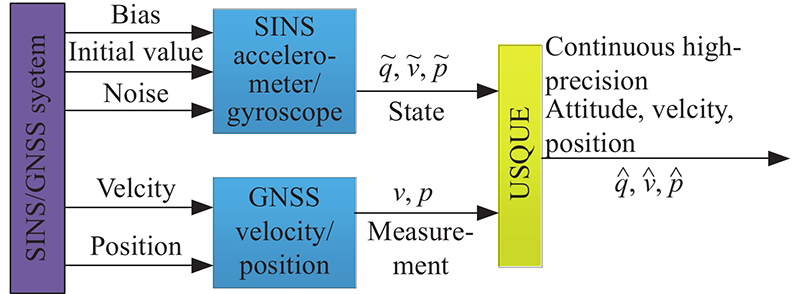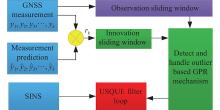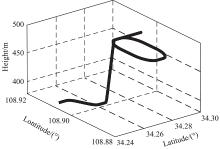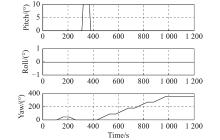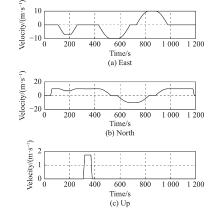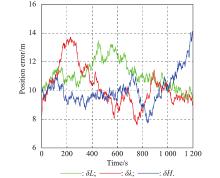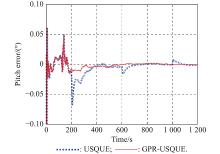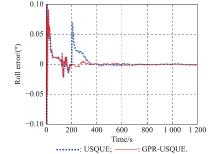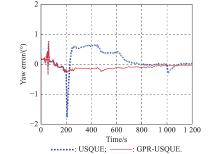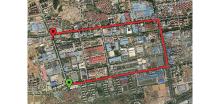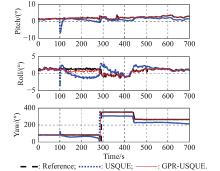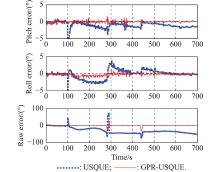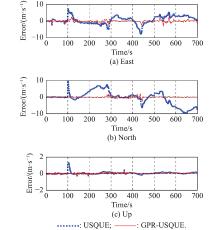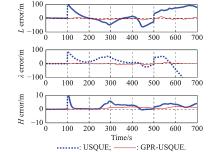| 1 |
WANG M S, WU W X, ZHOU P Y, et al. State transformation extended Kalman filter for GPS/SINS tightly coupled integration. GPS Solutions, 2018, 22(4): 112−124.
|
| 2 |
HU G G, GAO S S, ZHONG Y M. A derivative UKF for tightly coupled INS/GPS integrated navigation. ISA Transactions, 2015, 56(2): 135−144.
|
| 3 |
YAN G M. Strapdown inertial navigation system algorithm and integrated navigation principle. Xi ’an: Northwestern Polytechnical University Press, 2019.
|
| 4 |
KALMAN R E. Canonical structure of linear dynamical systems. Proceedings of the National of Academy Sciences, 1962, 48(4): 596−600.
|
| 5 |
LI Y Y, WANG H, HOU C H. UKF based nonlinear filtering using minimum entropy criterion. IEEE Trans. on Signal Processing, 2013, 61(20): 4988−4999.
|
| 6 |
GUSTAFSSON F, HENDEBY G. Some relations between extended and unscented Kalman filters. IEEE Trans. on Signal Processing, 2012, 60(2): 545−555.
|
| 7 |
JULIER S, UHLMANN J, DURRANT WHITE H. A new method for the nonlinear transformation of means and covariances in filters and estimators. IEEE Trans. on Automatic Control, 2001, 45(3): 477−482
|
| 8 |
LEFFERTS E J, MARKLEY F L, SHUSTER M D. Unscented filtering for spacecraft attitude estimation. Journal of Guidance, Control and Dynamics, 2003, 26(4): 536−542.
|
| 9 |
LI K L, HU B Q, CHANG L B. Modified quaternion unscented Kalman filter. Systems Engineering and Electronics, 2016, 38(6): 1399−1404. (in Chinese)
|
| 10 |
ZHANG M, LI K L, HU B Q, et al. Comparison of Kalman filters for inertial integrated navigation. Sensors, 2019, 19(6): 1426−1452.
|
| 11 |
GUPTA M, BEHERA L, SUBRAMANIAN V K, et al. A robust visual human detection approach with UKF-based motion tracking for a mobile robot. IEEE Systems Journal, 2015, 9(4): 1363−1375.
|
| 12 |
LUO K X, WU M P, FAN Y. Robust adaptive filtering based on maximum entropy method and its application. Systems Engineering and Electronics, 2020, 42(3): 667−673.
|
| 13 |
LIU Q, XU X S, HAN B. An integrated navigation method based on SINS/DVL-WT for AUV. Applied Mechanics and Materials, 2013, 303(2): 904−907.
|
| 14 |
CHANG G B. Robust Kalman filtering based on Mahalanobis distance as outlier judging criterion. Journal of Geodesy, 2014, 88(4): 391−401.
|
| 15 |
LI W L, SUN S H, JIA Y M, et al. Robust unscented Kalman filter with adaptation of process and measurement noise covariances. Digital Signal Processing, 2016, 48: 93–103.
|
| 16 |
ZHENG B Q, FU P C, LI B Q, et al A robust adaptive unscented Kalman filter for nonlinear estimation with uncertain noise covariance. Sensors, 2018, 18 (3): 808- 823.
doi: 10.3390/s18030808
|
| 17 |
CHANG L B, HU B Q, CHANG G B, et al. Multiple outliers suppression derivative-free filter based on unscented transformation. Journal of Guidance, Control & Dynamics, 2015, 35(6): 1902−1907.
|
| 18 |
YE W, CAI C G, YANG P, et al. UKF estimation method incorporating Gaussian process regression. Journal of Beijing University of Aeronautics and Astronautics, 2019, 45(6): 1081−1087.
|
| 19 |
HE Z K, LIU G B, ZHAO X J, et al. Overview of Gaussian process regression. Control and Decision, 2013, 28(8): 1121−1129. (in Chinese)
|
| 20 |
QIN F J, CHANG L B, HU B Q, et al. Strapdown inertial navigation system alignment based on marginalised unscented Kalman filter. IET Science, Measurement & Technology, 2013, 7(2): 128−138.
|
| 21 |
CHANG L B, HU B Q, CHANG G B. Modified unscented quaternion estimator based on quaternion averaging. Journal of Guidance, Control, and Dynamics, 2014, 37(1): 305−309.
|
| 22 |
ZHANG L, LIU Z, ZHANG J Q. A genetic Gaussian process regression model based on memetic algorithm. Journal of Central South University, 2013, 20(11): 3085−3093. (in Chinese)
|
| 23 |
LEHEL C, MANFRED O Sparse online Gaussian processes. Neural Computation, 2002, 14 (3): 641- 669.
doi: 10.1162/089976602317250933
|
| 24 |
RASMUSSEN C E, WILLIAMS C. Gaussian processes for machine learning. London: MIT Press, 2006.
|
 ), Baiqing HU1(
), Baiqing HU1( ), Yongbin DAI3(
), Yongbin DAI3( ), Mingfang SUN4,*(
), Mingfang SUN4,*( ), Yi LIU1(
), Yi LIU1( ), Duanyang GAO1(
), Duanyang GAO1( )
)

